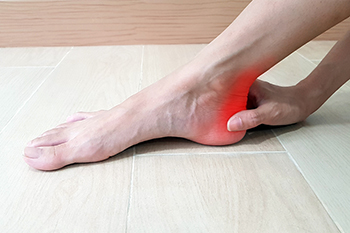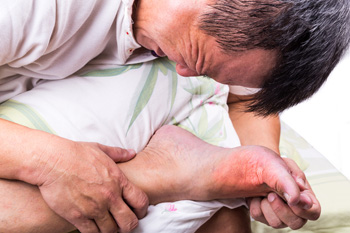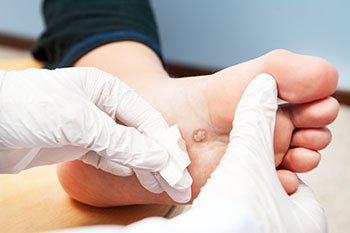

The muscles in the feet can become overworked. This may result in foot pain, and it can happen from repetitive body movement. Foot pain may also occur from wearing shoes that do not fit correctly or standing on hard or uneven surfaces for most of the day. People who are overweight may also experience foot pain from the extra weight the feet must endure. Additionally, existing foot conditions such as flat feet, bunions, or hammertoe may cause foot pain, and many patients seek relief from a podiatrist. It is beneficial to wear shoes that are made with quality materials, in addition to having good arch support and shock absorbers. Many people enjoy having regular foot massages performed to help reduce aches and foot pain. If you have foot pain for any reason, it is strongly suggested you are under the care of a podiatrist who can diagnose the cause and offer treatment solutions that are right for you.
Foot Pain
Foot pain can be extremely painful and debilitating. If you have a foot pain, consult with Dr. Alan J. Spector from Shore Podiatry. Our doctor will assess your condition and provide you with quality foot and ankle treatment.
Causes
Foot pain is a very broad condition that could be caused by one or more ailments. The most common include:
Diagnosis
To figure out the cause of foot pain, podiatrists utilize several different methods. This can range from simple visual inspections and sensation tests to X-rays and MRI scans. Prior medical history, family medical history, and any recent physical traumatic events will all be taken into consideration for a proper diagnosis.
Treatment
Treatment depends upon the cause of the foot pain. Whether it is resting, staying off the foot, or having surgery; podiatrists have a number of treatment options available for foot pain.
If you have any questions, please feel free to contact our office located in Point Pleasant, NJ . We offer the newest diagnostic and treatment technologies for all your foot care needs.

There are many different types of Achilles tendon injuries. For example, a common type of Achilles tendon injury is known as an Achilles tendon rupture. This condition can occur when the tendon above the heel is disrupted partially or entirely. A medical professional can perform specific tests that can determine whether or not an individual has an Achilles tendon rupture. Namely, the Matles test advises that if a patient cannot easily stand on their tiptoes, it may indicate an Achilles tendon rupture. Additionally, the Simmonds–Thompson test can be performed when a medical professional squeezes the calf muscle. If there is no downward motion in the foot, this may also indicate an Achilles tendon rupture has occurred. If you are someone that thinks they may be living with an Achilles tendon injury, it is suggested that you schedule an appointment with a podiatrist today.
Achilles tendon injuries need immediate attention to avoid future complications. If you have any concerns, contact Dr. Alan J. Spector of Shore Podiatry. Our doctor can provide the care you need to keep you pain-free and on your feet.
What Is the Achilles Tendon?
The Achilles tendon is a tendon that connects the lower leg muscles and calf to the heel of the foot. It is the strongest tendon in the human body and is essential for making movement possible. Because this tendon is such an integral part of the body, any injuries to it can create immense difficulties and should immediately be presented to a doctor.
What Are the Symptoms of an Achilles Tendon Injury?
There are various types of injuries that can affect the Achilles tendon. The two most common injuries are Achilles tendinitis and ruptures of the tendon.
Achilles Tendinitis Symptoms
Rupture Symptoms
Treatment and Prevention
Achilles tendon injuries are diagnosed by a thorough physical evaluation, which can include an MRI. Treatment involves rest, physical therapy, and in some cases, surgery. However, various preventative measures can be taken to avoid these injuries, such as:
If you have any questions please feel free to contact our office located in Point Pleasant, NJ . We offer the newest diagnostic tools and technology to treat your foot and ankle needs.

A reddened, painful, and swollen big toe can be the result of a type of arthritis called gout. This uncomfortable condition is caused by an overabundance of uric acid in the body. If not properly eliminated through the kidneys, uric acid can collect in the joints, where it crystallizes. The result is pain that flares up suddenly and stays active for up to a week or more. Risk factors for developing gout include age, diet, obesity, and genetics. Gout cannot be cured, but it can be treated by a foot doctor who is a specialist in dealing with this condition. Treatment options include non-steroidal anti-inflammatory medication, changes in diet, and certain lifestyle modifications. One of the best methods of preventing gout flare-ups is reducing the amount of purines in the foods that are eaten. Seafood, red meat, shellfish, and drinks sweetened with large amounts of sugar fall into this category. Reducing the amount of alcoholic beverages and caffeine also helps, along with increasing exercise, drinking more water, and losing weight. For professional help in managing gout attacks, it is suggested that you make an appointment with a podiatrist.
Gout is a foot condition that requires certain treatment and care. If you are seeking treatment, contact Dr. Alan J. Spector from Shore Podiatry. Our doctor will treat your foot and ankle needs.
What Is Gout?
Gout is a type of arthritis caused by a buildup of uric acid in the bloodstream. It often develops in the foot, especially the big toe area, although it can manifest in other parts of the body as well. Gout can make walking and standing very painful and is especially common in diabetics and the obese.
People typically get gout because of a poor diet. Genetic predisposition is also a factor. The children of parents who have had gout frequently have a chance of developing it themselves.
Gout can easily be identified by redness and inflammation of the big toe and the surrounding areas of the foot. Other symptoms include extreme fatigue, joint pain, and running high fevers. Sometimes corticosteroid drugs can be prescribed to treat gout, but the best way to combat this disease is to get more exercise and eat a better diet.
If you have any questions please feel free to contact our office located in Point Pleasant, NJ . We offer the newest diagnostic and treatment technologies for all your foot and ankle needs.

Various injuries can happen to the feet, and stretching the feet may be beneficial in strengthening the affected foot. It is helpful to be aware of existing pain levels, and beginning slowly will accomplish this. Intensity and repetition may be increased as the foot becomes stronger, and stretching will become easier. Calf stretches can help the heel and Achilles tendon. A calf stretch is done by standing on a step and lowering one heel until a gentle stretch is felt. It is helpful to monitor pain levels as stretches are performed, and this can be an accurate gauge of building strength. It is suggested to hold the stretch for 30 seconds and perform several repetitions. If you would like more information about the benefits of stretching the feet, it is recommended that you consult with a podiatrist who can help you with the knowledge you are seeking.
Stretching the feet is a great way to prevent injuries. If you have any concerns with your feet consult with Dr. Alan J. Spector from Shore Podiatry. Our doctor will assess your condition and provide you with quality foot and ankle treatment.
Stretching the Feet
Being the backbone of the body, the feet carry your entire weight and can easily become overexerted, causing cramps and pain. As with any body part, stretching your feet can serve many benefits. From increasing flexibility to even providing some pain relief, be sure to give your feet a stretch from time to time. This is especially important for athletes or anyone performing aerobic exercises, but anyone experiencing foot pain or is on their feet constantly should also engage in this practice.
Great ways to stretch your feet:
Individuals who tend to their feet by regular stretching every day should be able to minimize foot pain and prevent new problems from arising.
If you have any questions, please feel free to contact our office located in Point Pleasant, NJ . We offer the newest diagnostic and treatment technologies for all your foot care needs.

A seed wart can result when an individual comes into direct contact with the human papillomavirus, or HPV. This skin growth can be quite unsightly and typically forms on the bottom, or sole, of the foot. They are characterized by the presence of very small black dots, known as seeds, in the center of the wart. Interestingly, these seeds are not really seeds in the traditional use of the word. Rather, these seeds are actually just tiny blood vessels that have become clotted. Therefore, although these tiny dots might look like seeds, they are in fact just blood vessels. The virus that causes seed warts is extremely contagious and can be spread by skin-to-skin contact and by other means. If you are someone that may have a seed wart, it is strongly suggested that you schedule an appointment with a podiatrist as quickly as possible who can analyze and address your foot problem.
Plantar warts can be very uncomfortable. If you need your feet checked, contact Dr. Alan J. Spector from Shore Podiatry. Our doctor will assist you with all of your foot and ankle needs.
About Plantar Warts
Plantar warts are the result of HPV, or human papillomavirus, getting into open wounds on the feet. They are mostly found on the heels or balls of the feet.
While plantar warts are generally harmless, those experiencing excessive pain or those suffering from diabetes or a compromised immune system require immediate medical care. Plantar warts are easily diagnosed, usually through scraping off a bit of rough skin or by getting a biopsy.
Symptoms
Treatment
To help prevent developing plantar warts, avoid walking barefoot over abrasive surfaces that can cause cuts or wounds for HPV to get into. Avoiding direct contact with other warts, as well as not picking or rubbing existing warts, can help prevent the further spread of plantar warts. However, if you think you have developed plantar warts, speak to your podiatrist. He or she can diagnose the warts on your feet and recommend the appropriate treatment options.
If you have any questions please feel free to contact our office located in Point Pleasant, NJ . We offer the newest diagnostic and treatment technologies for all your foot and ankle needs.